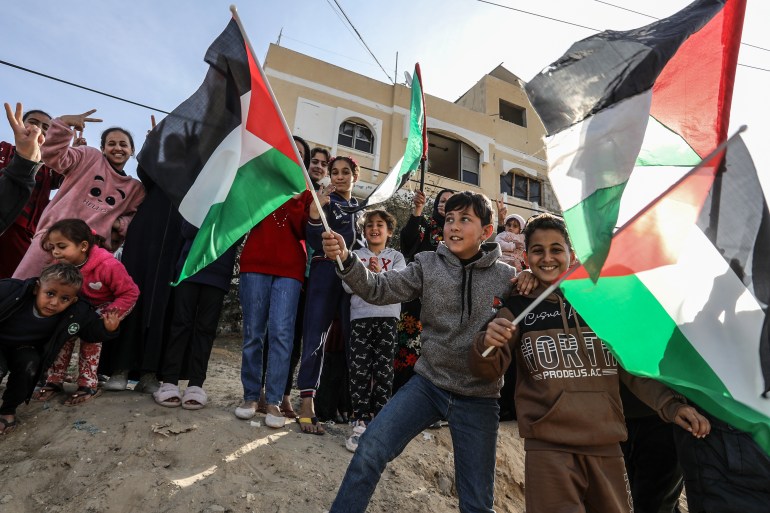Following 15 months of fighting that left much of the coastal Palestinian enclave ablaze, celebrations erupted across the Gaza Strip.
After Hamas provided a list of three female captives to be released as part of the deal to Israel through mediators, the ceasefire came into effect on Sunday at 11:15 am local time (9:15 GMT).
“My joy is beyond measure”, said Gaza resident Om Salah.
I packed everything up right away as soon as they declared the ceasefire so that I could travel to Gaza City. My children are extremely happy to go and see our families, relatives and our lands”, she told Al Jazeera.
“Here, we are always scared and worried, but back home we will be very happy, and joy will come back to our lives”.
A young Palestinian man said, “Everyone is happy, particularly the children”.
“Hopefully, the Israelis will not violate it]ceasefire] in the next few days”, he told Al Jazeera.
He claimed to finish his education as all he wanted to do. During this genocide, “a lot of dreams were destroyed.”
We kept it alive, they say.
In the streets of Gaza, health workers and rescuers were also seen celebrating. Numerous civil defense teams chanted and raised victory signs in videos that were shared online and verified by Al Jazeera.
Al Jazeera’s Hani Mahmoud, reporting from outside Al-Aqsa Martyrs Hospital in Deir el-Balah, said there were “no violations reported since the ceasefire took effect”.
“There have been no more bombs, no more fighter jets, and no more drones. The only instances of gunfire to be heard are from street celebrations, he claimed. “We’ve heard both gunshots and fireworks frequently.”
Before the ceasefire was implemented, Israeli forces also killed at least 19 Palestinians and injured dozens more on Sunday, bringing the total number of deaths in the 15-month genocide to nearly 47, 000. The actual figure, according to Palestinian rights organizations, could be significantly higher.
At least 1, 139 people were killed in Israel during the Hamas-led attacks on October 7, 2023, and about 250 were taken captive.
Al Jazeera’s Hind Khoudary, reporting from Khan Younis, said Palestinians from the southern city of Rafah described the destruction caused by Israel there as “massive”.
She claimed that they had no idea where their neighborhoods were.
“Nevertheless, people are very happy. You see everyone smiling, you see everyone chanting, and most of the Palestinians are saying: ‘ We made it alive out of this war. ‘”
“Angel and uncertainty”
Palestinian families began tearing down their tents and returning to their homes as a result of constant Israeli bombings, according to Al Jazeera’s Mahmoud, who was reporting from the hospital’s courtyard.
Families are reportedly gathered their belongings while they were at the hospital, which we are seeing. As they leave the hospital gates, their faces are so excited, he continued.
Despite reports that his home had been destroyed, Anwar, a Palestinian displaced man who lives in Khan Younis and chose not to provide his last name, said he hoped to return to Rafah.
He told Al Jazeera, “I will go there and I will look for a place to set up a tent to live with my eight-member family.” I must return to my hometown. I must return to the birthplace.
Anwar said the months of war were like a “nightmare”. “It was literally a nightmare, as if we]were] dreaming and then we got up again”, Anwar said.
He claimed that his family and he had to rely on cheap food and water and that the cost of goods was “scarily high.”

Other displaced people have reported coming home, but they discovered that even the most extensive destruction makes it difficult to even construct a temporary shelter.
Palestinian displaced person Mahmoud Anwar Abu-Salem, who has spent three months in the Shati refugee camp in Gaza City, has spoken to Al Jazeera after speaking with the network.
“The house, the whole thing, was reduced to rubble. Fifty members of my family will live in the streets”, he said, explaining that before the war, the five-floor building housed many of his relatives.
“Schools have also been destroyed. There is no life at all”, Abu Salem said. “Even the mosque was targeted and destroyed. Even so, setting up a tent here is challenging.
Nour Saqqa, a displaced Palestinian woman from Gaza City, said she feels an “overwhelming mixture of emotions”.
According to Saqqa, “we haven’t been completely relieved, not just because of how stressful these 15 months have been, but also because the ceasefire itself has been splintered and not announced and implemented all at once,” Saqqa told Al Jazeera in Rafah.
Saqqa claimed that the population is suffering “even more psychological stress” because she and other Palestinians from Gaza City were still prohibited from returning to their homes during the first phase of the ceasefire.
Source: Aljazeera

Leave a Reply